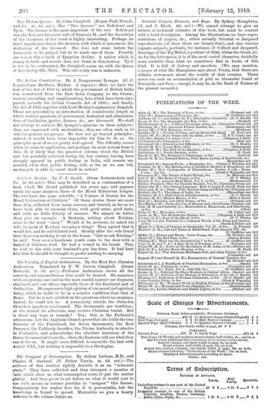The Indian Constitution. By A. Rangaswami Iyengar. (G. C. Loganadham
Brothers, Madras. 2 rupees.)—Hero we have the text of the Act of 1858 by which the government of British India was transferred from the East India Company to the Crown; various amending and supplementing Acts which have been since passed (notably the Indian Councils Act of 1861) ; and finally, the Act of 1909, together with Lord Morley's explanatory despatch. These are preceded by an introduction of considerable length in which various questions of government, historical and administra- tive, of legislation, justice, finance, &e., are discussed. We shall not attempt to criticise Mr. Iyengar's opinions on these subjects : they are expressed with moderation; they are often such as to win our general acceptance. He does not go beyond principles ; indeed, it would have been impossible for him to do so. On principles most of us are pretty well agreed. The difficulty occurs when we come to application, and perhaps its most serious form is this : Is it likely that the practical reforms which the British rule has painfully achieved during the last century, having been strongly opposed by public feeling in India, will remain un- assailed when that public feeling, still, as far as we can tell, unchanged, is able to assert itself in action?










































 Previous page
Previous page